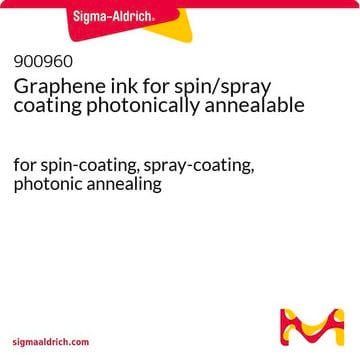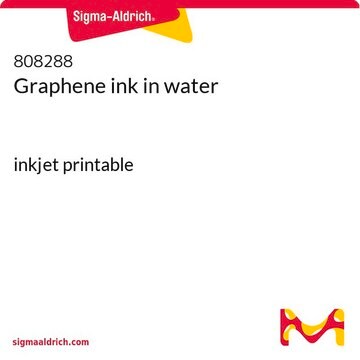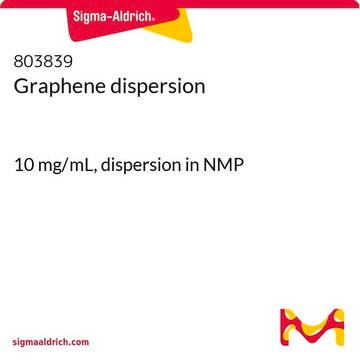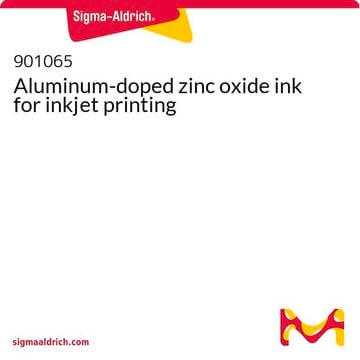793663
Graphene dispersion
forinkjet printing, with ethyl cellulose in cyclohexanone and terpineol, inkjetprintable
Synonym(s):
inkjetting ink, conductive ink
About This Item
Recommended Products
product name
Graphene ink, for inkjet printing, with ethyl cellulose in cyclohexanone and terpineol, inkjet printable
form
liquid
greener alternative product characteristics
Design for Energy Efficiency
Learn more about the Principles of Green Chemistry.
sustainability
Greener Alternative Product
concentration
2.4 wt. % (solid (graphene and ethyl cellulose) in cyclohexanone/terpineol)
resistivity
0.003-0.008 Ω-cm (thermally annealed 250°C for 30 minutes, film thickness >100 nm)
particle size
≤3 μm
surface tension
30 dyn/cm
viscosity
8-15 mPa.s(30 °C)
bp
213-218 °C (Terpineol)
density
0.9375 g/mL at 25 °C
greener alternative category
SMILES string
OC(C1=C2C(C3=C(C4=C(C5=C(C6=C(C7=C(C8=C(C9=C(C%10=C(C%11=C(C%12=C(C%13=C(C%14=C(C%15=CC=C%16O)C%16=C%17)C%17=C%18)C%18=C%19C(O)=O)C%19=C%20)C%20=C%21O)C%21=C%22)C%22=C%23)C%23=C%24O)C%24=C%25)C%25=C%26C(O)=O)C%26=C%27)C%27=C2)=C%28C%29=C(C%30=C%31C%28=C%3
Looking for similar products? Visit Product Comparison Guide
General description
Application
Curing Condition: 250-350°C, 20-30min
This ink was tested on polyimide and silicon dioxide substrates.
Other Notes
Legal Information
Signal Word
Danger
Hazard Statements
Precautionary Statements
Hazard Classifications
Acute Tox. 4 Dermal - Acute Tox. 4 Inhalation - Acute Tox. 4 Oral - Eye Dam. 1 - Skin Irrit. 2 - STOT SE 3
Target Organs
Respiratory system
Storage Class Code
10 - Combustible liquids
WGK
WGK 2
Flash Point(F)
143.6 °F
Flash Point(C)
62 °C
Certificates of Analysis (COA)
Search for Certificates of Analysis (COA) by entering the products Lot/Batch Number. Lot and Batch Numbers can be found on a product’s label following the words ‘Lot’ or ‘Batch’.
Already Own This Product?
Find documentation for the products that you have recently purchased in the Document Library.
Customers Also Viewed
Articles
Functional materials for printed electronics applications enable flexible displays, RFID tags, and biomedical sensors.
Graphene is a unique two-dimensional (2D) structure of monolayer carbon atoms packed into a dense honeycomb crystal that has attracted great interest due to its diverse and fascinating properties.
Since its discovery little more than a decade ago,1 the two-dimensional (2D) allotrope of carbon—graphene—has been the subject of intense multidisciplinary research efforts.
Graphene's unique properties spark interdisciplinary interest; its honeycomb structure offers electrical, optical, and mechanical marvels.
Our team of scientists has experience in all areas of research including Life Science, Material Science, Chemical Synthesis, Chromatography, Analytical and many others.
Contact Technical Service

